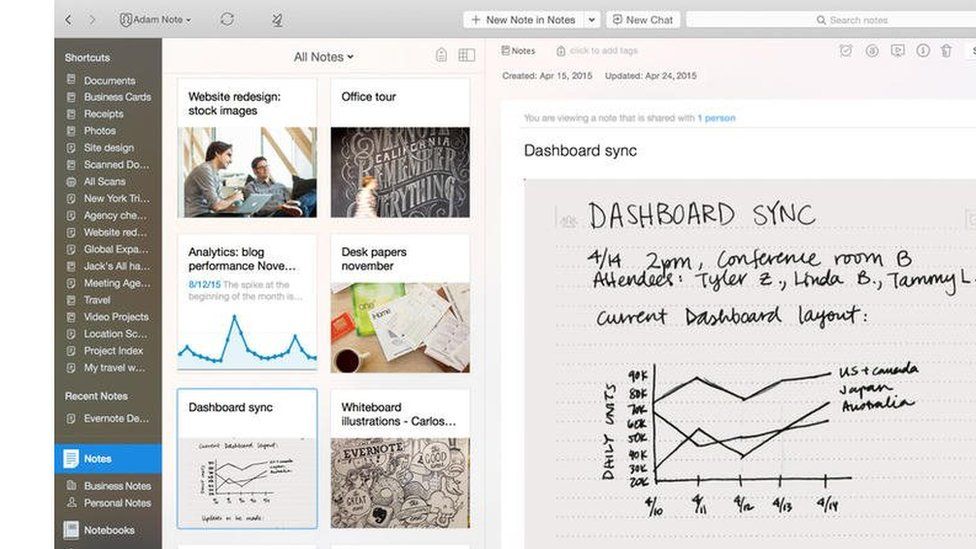Evernote clampdown causes anger
- Published

Evernote has restricted the use of the free version of its note-taking app and raised prices for the paid-for ones.
The company said the moves would help it invest in new features.
But it faces a backlash from users unhappy at being limited to synching notes across two devices - rather than an unlimited number - unless they pay.
Microsoft, Apple and Google all offer competing services that do not place this constraint on members who do not pay a subscription.
Microsoft's OneNote may be the biggest beneficiary, as it recently introduced a data migration tool for Windows users wanting to make the switch.
"The economics of Evernote didn't make sense until this point as most users had no real incentive to move to a premium subscription," said Ben Wood, from the tech consultancy CCS Insight.
"So, I'm unsurprised this has happened. The big question is does this approach stack up in terms of getting enough people to pay these prices?"
Evernote recently announced it had about 200 million customers.
'Reap the benefits'
Part of the Evernote's appeal is that if a user adds or updates a note on one device, the change appears on all the other machine they use the app on.
Restricting this to just two computers still allows people to trial the service, but limits its utility.
The company's chief executive highlighted that, unlike some rivals, Evernote did not rely on adverts to top up its profits.
"Our goal is to continue improving Evernote for the long-term, investing in our core products to make them more powerful and intuitive while also delivering often-requested new features," Chris O'Neill blogged.
"But that requires a significant investment of energy, time, and money.
"We're asking those people who get the most value from Evernote to help us make that investment and, in return, to reap the benefits."
The subscription fees for "plus" and "premium" subscriptions - which offer different amounts of online storage - have both risen by about 40%, taking them to $34.99 and $69.99 respectively (£29.99 and £44.99 in the UK).
Since taking charge last year, Mr O'Neill has also cut jobs, dropped support for non-core services and shaken up Evernote's leadership team as part of efforts to boost sales and prepare for a flotation.
The latest move marks a sharp contrast with the strategy of the company's previous chief executive.
"Unlike most freemium models, which are basically try to monetise you really, really early, we look at a user and we say we have the rest of your life to make money from you," Phil Libin told the BBC in 2013.
"Every month that you stay, you're getting friends into it and you're more likely to start paying and soon you're more likely to buy other [add-on physical] products. So, the free part of Evernote is the main part."
'Basically useless'
The California-based company has created a forum to discuss its changes.
Several users praised the service, but there were also many complaints.
"I wonder how much more revenue will be generated by this increase versus how much they will lose from users like myself leaving permanently," wrote Owen Finn.
Josh Serrano said: "Limiting to two devices is insane."
Several tech writers were also critical.
"An Evernote free basic account is now basically useless," wrote Gizmodo's Gerald Lynch.
"Looks like rival Google Keep... is about to get a massive influx of new users."
Security blogger Troy Hunt said: "Know what people really like? Taking something they've used for years, then crippling it unless they pay."
But Techcrunch's Devin Coldewey suggested many long-time users of the app might want to hold tight.
"The increased pricing may cause some short-term frustration and a few people jumping ship, but as many of us have found, a service that works for us and into which we've poured years of data is generally worth keeping around," he said.
- Published11 June 2014
- Published5 January 2014
- Published11 March 2013